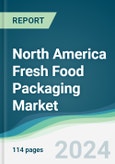The North American fresh food packaging market is expected to experience a CAGR of 6.38% throughout the forecast period, reaching a market size of US$25.373 billion by 2029. This represents a substantial increase from US$16.461 billion recorded in 2022.
The increasing reliance of consumers on packaged food items and the established presence of food processing companies in the area are driving growth in the market. The market is expected to be driven by the growing number of food service providers who are successfully implementing digitalization into their operations. Food packaging sales are being supported by the ease with which consumers can select food items based on their tastes and health preferences, as well as the convenient payment options. Moreover, a significant market for American producers of food packaging is the dairy industry. Furthermore, throughout the forecast period, the rising demand for plant-based dairy products is anticipated to present profitable opportunities for the nation's packaging product manufacturers.Increasing demand for extended shelf life and the rising e-commerce industry propel the market.
Packaging food takes time to reach consumers all over the world. As a result, before the food reaches the consumer, it might not be fresh and lose its flavor and aroma. Food spoiling before it reaches the consumer is becoming a bigger risk, which would mean the money spent on packaging would be lost. The food processing industries are making investments in new technologies and packaging methods, like engineering science and intelligent packaging, to address this challenge and extend the shelf life of their products. In addition, companies are paying attention to customer satisfaction in addition to revenue because it affects their reputation and market value.Further, consumers are choosing packaged goods with longer shelf lives due to growing health consciousness and awareness about eating fresh food. The market is growing as a result of growing demand worldwide, including in the US, for goods with longer shelf lives. Moreover, the use of sustainable food service packaging in Quick Service Restaurants has become critical. Due to time constraints, more people are choosing fast food for supper instead of cooking at home. Food service companies can provide customers with a quick and simple way to transport meals by employing sustainable packaging styles to package meals safely and affordably. For instance, as per the International Franchise Association, the number of quick-service restaurant franchise establishments increased from 188.4k in 2021 to 192.43k in 2022 in the United States. Furthermore, the rising demand for fresh food home delivery services and e-commerce platforms creates a significant market for packaging solutions that preserve product integrity during last-mile delivery, storage, and transit. The need for convenience in urban areas, in particular, has led to a shift in consumer behavior that has accelerated the fresh food packaging market trend. Many companies make investments in cutting-edge packaging technology to maintain fresh food products at the ideal temperature during transportation. For instance, temperature-sensitive goods like dairy and seafood are transported in insulated packaging with cooling or heating components, which is increasing the market demand for fresh food packaging in North America.
It is projected that the market in the United States will grow steadily.
The fresh food packaging market in the United States is experiencing significant growth, driven by various key factors such as high disposable income, increased spending on fresh food consumption, and a growing consumer preference for bio-based materials as alternatives to harmful plastics in meat packaging. This shift towards eco-friendly materials aligns with the rising demand for sustainable packaging solutions.Additionally, the presence of well-established application industries in the country, combined with a decreasing reliance on plastic in the food and beverage sector, is anticipated to contribute to the market's expansion. The trend towards reducing plastic usage aligns with consumer preferences and environmental concerns, further driving the demand for innovative and sustainable packaging solutions in the fresh food industry.
Moreover, the United States Department of Food Safety and Inspection Services plays a crucial role in ensuring the safety of packaging materials in direct contact with food. The approval process involves a list of packaging materials provided by the "Packaging Material for Irradiated Foods" in the Code of Federal Regulation, Title 21. Government initiatives to regulate and approve packaging materials are expected to provide a significant boost to the development and adoption of new and innovative products in the fresh food packaging market.
Market Key Developments
- December 2023, Novolex®, a leader in packaging choice, innovation, and sustainability, introduced food packaging containers that are both recyclable (where facilities exist) and made with a minimum of 10% post-consumer recycled (PCR). The new products, which are made by Waddington® North America (WNA), a Novolex brand, come in a variety of sizes and are available for dessert cups, tamper-evident containers, cake containers, and bakery clamshells.
Segmentation:
By Material:
- Plastic
- Paper and Board
- Glass
- Metal
By Application:
- Poultry and Meat Products
- Dairy Products
- Produce (Vegetables and Fruits)
- Seafood
- Others
By Country
- U.S.
- Canada
- Mexico
Table of Contents
Companies Mentioned
- Nitto Denko Corporation (Mondi)
- SEE (Liquibox)
- Amcor Plc
- Sealed Air
- Sonoco Products Company
- NNZ, Inc.
- Cascades inc.
Table Information
| Report Attribute | Details |
|---|---|
| No. of Pages | 114 |
| Published | February 2024 |
| Forecast Period | 2022 - 2029 |
| Estimated Market Value ( USD | $ 16.46 Billion |
| Forecasted Market Value ( USD | $ 25.37 Billion |
| Compound Annual Growth Rate | 6.3% |
| Regions Covered | North America |
| No. of Companies Mentioned | 7 |









